December 23, 2015 •
2016 Omnibus Appropriations Bill’s Campaign Finance Changes
Among the riders in the federal 2016 Omnibus Appropriations bill passed into law on December 18, 2015, were two provisions affecting campaign finance. Congress explicitly prohibited the Internal Revenue Service from making new rules concerning the political speech or activity […]
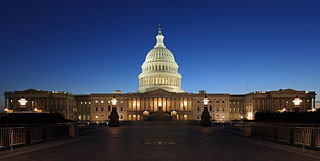 Among the riders in the federal 2016 Omnibus Appropriations bill passed into law on December 18, 2015, were two provisions affecting campaign finance. Congress explicitly prohibited the Internal Revenue Service from making new rules concerning the political speech or activity of 501(c)(4) organizations. The legislation also prohibits the Securities and Exchange Commission from issuing regulations requiring corporations to disclose their political activity to their shareholders.
Among the riders in the federal 2016 Omnibus Appropriations bill passed into law on December 18, 2015, were two provisions affecting campaign finance. Congress explicitly prohibited the Internal Revenue Service from making new rules concerning the political speech or activity of 501(c)(4) organizations. The legislation also prohibits the Securities and Exchange Commission from issuing regulations requiring corporations to disclose their political activity to their shareholders.
The Senate’s version of the Financial Services and General Government Appropriations Act, 2016, Senate Bill 1910, contained language altering the law regarding coordination between candidates and political parties. However, opposition from both parties prevented this rider making it in the final passed bill. The final bill also did not include a rider from House Resolution 2995, the House’s version of the bill, which would have barred the use of funds to recommend or require any entity submitting an offer for a federal contract to disclose specified political contributions as a condition of submitting the offer.
Photo of the United States Capitol by Martin Falbisoner on Wikimedia Commons.
December 1, 2015 •
Federal Appropriations Bill Has Campaign Finance Changes Included
Changes to the federal campaign finance laws may be included in the looming appropriations bill Congress considers this month. The Senate version of the Financial Services and General Government Appropriations Act, 2016, Senate Bill 1910, contains language altering the law […]
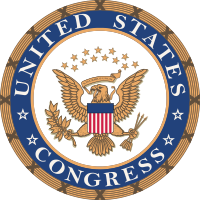 Changes to the federal campaign finance laws may be included in the looming appropriations bill Congress considers this month.
Changes to the federal campaign finance laws may be included in the looming appropriations bill Congress considers this month.
The Senate version of the Financial Services and General Government Appropriations Act, 2016, Senate Bill 1910, contains language altering the law regarding coordination between candidates and political parties.
House Resolution 2995, the House’s version of the bill, contains three riders concerning campaign finance. One of its provisions would prohibit the IRS from using funds provided by the bill to determine a church is not exempt from taxation for participating in, or intervening in, any political campaign unless the IRS Commissioner consents, Congress is notified, and the determination is effective no earlier than 90 days after congressional notification. Another section of the House bill prohibits the SEC from using funds provided by the bill to require the disclosure of political contributions, contributions to tax exempt organizations, or dues paid to trade associations. A further change to campaign finance law included in the House version of the appropriation bill would bar the use of funds to recommend or require any entity submitting an offer for a federal contract to disclose specified political contributions as a condition of submitting the offer.
October 29, 2015 •
Paul Ryan Elected as Speaker of the House
Rep. Paul Ryan has been elected as the new Speaker of the House. The seat was left vacant after John Boehner’s resignation. The vote took place this morning on the Hill, where Ryan needed 218 votes to win the majority. […]
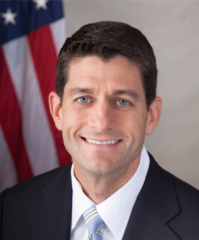 Rep. Paul Ryan has been elected as the new Speaker of the House. The seat was left vacant after John Boehner’s resignation.
Rep. Paul Ryan has been elected as the new Speaker of the House. The seat was left vacant after John Boehner’s resignation.
The vote took place this morning on the Hill, where Ryan needed 218 votes to win the majority. He received 236 votes, while Rep. Nancy Pelosi received 184 and Rep. Daniel Webster received 9. Three votes for unofficial candidates were cast, including Rep. John Lewis, Rep. Jim Cooper, and former Secretary of State Colin Powell.
In his speech, Ryan acknowledged the vast difference between Republicans and Democrats, but encouraged unity to fight problems head on. He also reminded Congress they work for the American people.
Ryan is the 62nd Speaker of the House.
October 6, 2015 •
Ask the Experts – Federal Post-Employment Restrictions
Q. We recently hired a lobbyist that is coming to our company directly from spending a number of years as a Senate staffer. What restrictions should we be aware of as her new employer in terms of who she can […]
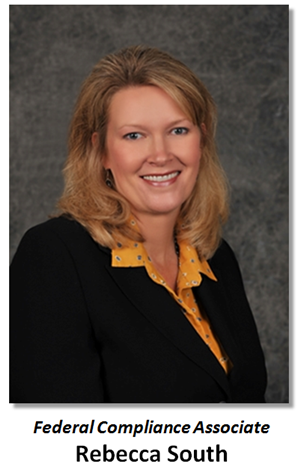 Q. We recently hired a lobbyist that is coming to our company directly from spending a number of years as a Senate staffer. What restrictions should we be aware of as her new employer in terms of who she can contact on the Hill?
Q. We recently hired a lobbyist that is coming to our company directly from spending a number of years as a Senate staffer. What restrictions should we be aware of as her new employer in terms of who she can contact on the Hill?
A. Both the House and the Senate have post-employment restrictions for certain individuals leaving their employment on the Hill. Importantly, the House and Senate ethics committees will discuss with the staffer prior to his or her departure the restrictions under which he or she must operate. That said, as her new employer you should definitely be aware of what restrictions are applicable to her situation so neither the company nor she violates the rules.
For the Senate, senior staff (currently defined as individuals whose annual salary is $130,500 or more) are subject to a one-year, Senate-wide ban. Essentially, senior staff leaving the Senate may not lobby the entire Senate for one year following their departure – this includes lobbying contact with personal, committee, and leadership offices. Staff making less than $130,500 a year are subject to a one year ban from lobbying their particular office – whether personal, committee, or leadership office.
The House restriction for senior staff is a one year ban from lobbying the particular office for which the former staffer worked and there is no ban in the House for staffers making less than $130,500.
You can directly submit questions for this feature, and we will select those most appropriate and answer them here. Send your questions to: experts@stateandfed.com.
(We are always available to answer questions from clients that are specific to your needs, and we encourage you to continue to call or e-mail us with questions about your particular company or organization. As always, we will confidentially and directly provide answers or information you need.) Our replies to your questions are not legal advice. Instead, these replies represent our analysis of laws, rules, and regulations.
September 25, 2015 •
U.S. House Speaker John Boehner Resigning in October
U.S. House Speaker John Boehner will resign and give up his seat in Congress at the end of October, according to his aides. He is currently under intense pressure from conservatives to defund Planned Parenthood as he attempts to keep […]
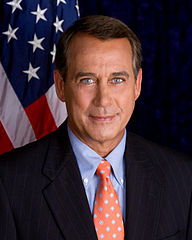 U.S. House Speaker John Boehner will resign and give up his seat in Congress at the end of October, according to his aides. He is currently under intense pressure from conservatives to defund Planned Parenthood as he attempts to keep the government open through the end of the year. Several members of the conservative base vowed not to vote for a bill if it did not defund the organization, and some are on a path to remove him as speaker.
U.S. House Speaker John Boehner will resign and give up his seat in Congress at the end of October, according to his aides. He is currently under intense pressure from conservatives to defund Planned Parenthood as he attempts to keep the government open through the end of the year. Several members of the conservative base vowed not to vote for a bill if it did not defund the organization, and some are on a path to remove him as speaker.
Since becoming speaker in 2011, Boehner has struggled to navigate politically with a polarized Congress and its increasingly conservative Republican members. Boehner’s announcement comes just a day after he had a private audience with Pope Francis at the Capitol. House Majority Leader Kevin McCarthy is expected to serve as the next speaker.
September 9, 2015 •
Obama Executive Order: Sick Leave for Federal Contract Workers
President Obama marked Labor Day by signing an Executive Order requiring federal contractors to offer their employees up to seven days of paid sick leave per year. The order also allows employees to use paid sick leave to care for […]
 President Obama marked Labor Day by signing an Executive Order requiring federal contractors to offer their employees up to seven days of paid sick leave per year. The order also allows employees to use paid sick leave to care for themselves, a family member, a domestic partner, or another loved one, and grants leave for absences resulting from domestic violence, sexual assault, or stalking, according to a White House press release.
President Obama marked Labor Day by signing an Executive Order requiring federal contractors to offer their employees up to seven days of paid sick leave per year. The order also allows employees to use paid sick leave to care for themselves, a family member, a domestic partner, or another loved one, and grants leave for absences resulting from domestic violence, sexual assault, or stalking, according to a White House press release.
The While House hopes the Executive Order will set a standard prodding “lawmakers, private employers, and state and local governments to expand their leave policies,” according to the New York Times. The order’s requirements will take effect with new contracts starting in 2017.
September 1, 2015 •
Hillary Clinton Supports Financial Services Conflict of Interest Act
On August 31, in a column on the Huffingtonpost.com, Hillary Clinton announced her support for a bill to limit the revolving door between the financial sector and the federal government. In the post, Clinton and Sen. Tammy Baldwin, the sponsor […]
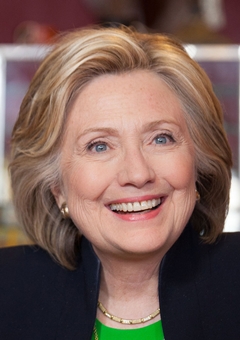 On August 31, in a column on the Huffingtonpost.com, Hillary Clinton announced her support for a bill to limit the revolving door between the financial sector and the federal government.
On August 31, in a column on the Huffingtonpost.com, Hillary Clinton announced her support for a bill to limit the revolving door between the financial sector and the federal government.
In the post, Clinton and Sen. Tammy Baldwin, the sponsor of the bill, specifically emphasized the bill would prohibit private sector employers from offering bonuses to employees when they leave to join the government.
House Resolution 3065, the Financial Services Conflict of Interest Act, also increases the prohibition on lobbying the federal government from one to two years, expands the definition of lobbying contact to include any lobbying activities and strategy, and requires senior financial service regulators to recuse themselves from any official actions directly or substantially benefiting the former employers or clients for whom they worked in the previous two years before joining federal service. The press release for the bill can be found here.
Photo of Hillary Clinton by Hillary for Iowa on Wikimedia Commons.
A new bill entered in the U.S. Senate would permanently ban members of both houses of Congress from ever becoming lobbyists. The legislation was introduced on August 5 by Sens. Michael Bennet and Al Franken. The Senate bill, entitled the […]
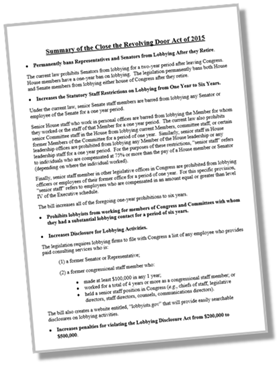 A new bill entered in the U.S. Senate would permanently ban members of both houses of Congress from ever becoming lobbyists. The legislation was introduced on August 5 by Sens. Michael Bennet and Al Franken.
A new bill entered in the U.S. Senate would permanently ban members of both houses of Congress from ever becoming lobbyists. The legislation was introduced on August 5 by Sens. Michael Bennet and Al Franken.
The Senate bill, entitled the Close the Revolving Door Act of 2015, additionally increases certain lobbying bans for senior Senate and House staff members from one year to six years after leaving the job. Another change the bill would implement is requiring lobbying firms to disclose paid consultant services by any employee who is a former senator or representative and certain former congressional staffers who made at least $100,000 in any one year, worked for four or more years as a staff member, or held a senior staff position in Congress. The bill also increases the maximum penalty for violating the Lobbying Disclosure Act, bans lobbyists from joining congressional staffs or committee staffs that they lobbied for six years, and creates a website to provide searchable disclosures on lobbying activities.
“The revolving door between Congress and the lobbying industry is a problem that needs fixing, because our democracy can’t function the way it’s supposed to when big interests have more power than the American people,” Franken said in a press release.
Federal contractors may be required to provide “paid leave to employees who are sick, are seeking medical attention or need to care for a sick relative,” according to an article published in today’s New York Times. The paper says it […]
 Federal contractors may be required to provide “paid leave to employees who are sick, are seeking medical attention or need to care for a sick relative,” according to an article published in today’s New York Times.
Federal contractors may be required to provide “paid leave to employees who are sick, are seeking medical attention or need to care for a sick relative,” according to an article published in today’s New York Times.
The paper says it obtained a confidential draft of a presidential executive order, marked “pre-decisional and deliberative,” requiring all federal contractors and subcontractors to provide leave for illnesses and for care of “a child, parent, spouse, domestic partner ‘or any other individual related by blood or affinity whose close association with the employee is the equivalent of a family relationship.’” The White House has refused to comment on the draft document.
July 29, 2015 •
Proposal to Change Federal Lobbying Laws
On July 28, proposals to reform federal lobbying laws were issued by an American Bar Association task force. The proposals include requiring lobbyists to register if they make more than one lobbying contact, receive more than $2,500 in compensation, or […]
 On July 28, proposals to reform federal lobbying laws were issued by an American Bar Association task force. The proposals include requiring lobbyists to register if they make more than one lobbying contact, receive more than $2,500 in compensation, or make expenditures of more than $10,000 per quarter and spend 12 hours or more per quarter conducting lobbying activity.
On July 28, proposals to reform federal lobbying laws were issued by an American Bar Association task force. The proposals include requiring lobbyists to register if they make more than one lobbying contact, receive more than $2,500 in compensation, or make expenditures of more than $10,000 per quarter and spend 12 hours or more per quarter conducting lobbying activity.
Other suggested requirements include disclosing the names of individuals providing “support for lobbying through strategic planning, public communications and polling operations.”
The U.S. Department of Justice announced the indictment of Rep. Chaka Fattah on several charges including bribery; conspiracy to commit wire, honest services, bank, and mail fraud; and money laundering. The Philadelphia congressman is accused of misappropriating federal grant money, […]
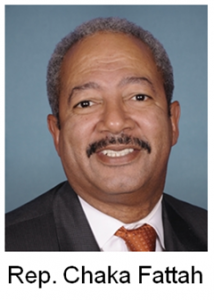 The U.S. Department of Justice announced the indictment of Rep. Chaka Fattah on several charges including bribery; conspiracy to commit wire, honest services, bank, and mail fraud; and money laundering. The Philadelphia congressman is accused of misappropriating federal grant money, arranging a federal grant in lieu of a payment to a political consultant, and other acts such as using the money to pay off his son’s student loans.
The U.S. Department of Justice announced the indictment of Rep. Chaka Fattah on several charges including bribery; conspiracy to commit wire, honest services, bank, and mail fraud; and money laundering. The Philadelphia congressman is accused of misappropriating federal grant money, arranging a federal grant in lieu of a payment to a political consultant, and other acts such as using the money to pay off his son’s student loans.
The indictment also includes four members of Rep. Fattah’s campaign and congressional staffs.
The congressman has served 11 terms and is the ranking member on the Appropriations Commerce, Justice and Science Subcommittee.
On June 2, U.S. Sen. Michael Bennett introduced Senate Bill 1480, The Lobbying and Campaign Finance Reform Act. According to Bennett’s press release, SB 1480 prohibits solicitations of campaign contributions from lobbyists when Congress is in session, eliminates lobbyist bundling […]
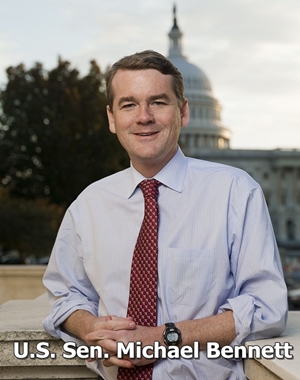 On June 2, U.S. Sen. Michael Bennett introduced Senate Bill 1480, The Lobbying and Campaign Finance Reform Act.
On June 2, U.S. Sen. Michael Bennett introduced Senate Bill 1480, The Lobbying and Campaign Finance Reform Act.
According to Bennett’s press release, SB 1480 prohibits solicitations of campaign contributions from lobbyists when Congress is in session, eliminates lobbyist bundling of large contributions, and amends the lobbying registration process to require a lobbyist to register if he or she makes two or more lobbying contacts for a client over a two-year period regardless of whether the lobbyist spends more than 20 percent of his or her time serving the particular client.
A bill introduced in the U.S. House of Representatives this week would permanently close the revolving door allowing members of Congress to become lobbyists once they leave office. House Resolution 1740 removes the cooling off periods currently in the statutes. […]
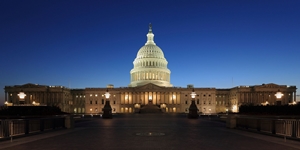 A bill introduced in the U.S. House of Representatives this week would permanently close the revolving door allowing members of Congress to become lobbyists once they leave office.
A bill introduced in the U.S. House of Representatives this week would permanently close the revolving door allowing members of Congress to become lobbyists once they leave office.
House Resolution 1740 removes the cooling off periods currently in the statutes. These periods require former House members to wait one year and former Senate members to wait two years before becoming lobbyists.
The bill’s sponsor Rep. Rod Blum states in his press release, “This bill would finally close the revolving door between Congress and special interest groups, restoring integrity to our political system and ensuring that politicians focus on representing their constituents instead of catering to lobbying groups who offer a lucrative post-electoral career.”
Photo of the United States Capitol at night by Martin Falbisoner on Wikimedia Commons.
December 15, 2014 •
Federal Omnibus Bill Allows Increased Political Contributions to Political Parties
With the Senate passing the House’s omnibus bill, the limits for political contributions to federal political parties will increase when President Barack Obama signs the bill. Included as a rider with House Resolution 83 is an amendment to the Federal […]
 With the Senate passing the House’s omnibus bill, the limits for political contributions to federal political parties will increase when President Barack Obama signs the bill. Included as a rider with House Resolution 83 is an amendment to the Federal Election Campaign Act of 1971 allowing additional contributions to political parties for presidential nominating conventions, for preparation for and the conduct of election recounts and contests and other legal proceedings, and for the construction, purchase, renovation, operation, and furnishing of one or more buildings for party headquarters.
With the Senate passing the House’s omnibus bill, the limits for political contributions to federal political parties will increase when President Barack Obama signs the bill. Included as a rider with House Resolution 83 is an amendment to the Federal Election Campaign Act of 1971 allowing additional contributions to political parties for presidential nominating conventions, for preparation for and the conduct of election recounts and contests and other legal proceedings, and for the construction, purchase, renovation, operation, and furnishing of one or more buildings for party headquarters.
An additional provision of the bill prohibits the federal government from recommending or requiring any entity submitting an offer for a federal contract to disclose, as a condition of submitting an offer, any political contribution, expenditure, independent expenditure, or disbursement for an electioneering communication by the offeror, its officers or directors, or any of its affiliates or subsidiaries.
Another provision included in the bill prohibits the federal government from paying for a portrait of an officer or employee of the federal government, including the president, the vice president, a member of Congress (including a delegate or a resident commissioner to Congress), the head of an executive branch agency, or the head of an office of the legislative branch.
The president has said he will sign the bill.
UDPATE: On December 16, President Obama signed the House Resolution 83 into law.
Photo of the U.S. Capitol by Martin Falbisoner on Wikimedia Commons.
State and Federal Communications, Inc. provides research and consulting services for government relations professionals on lobbying laws, procurement lobbying laws, political contribution laws in the United States and Canada. Learn more by visiting stateandfed.com.

